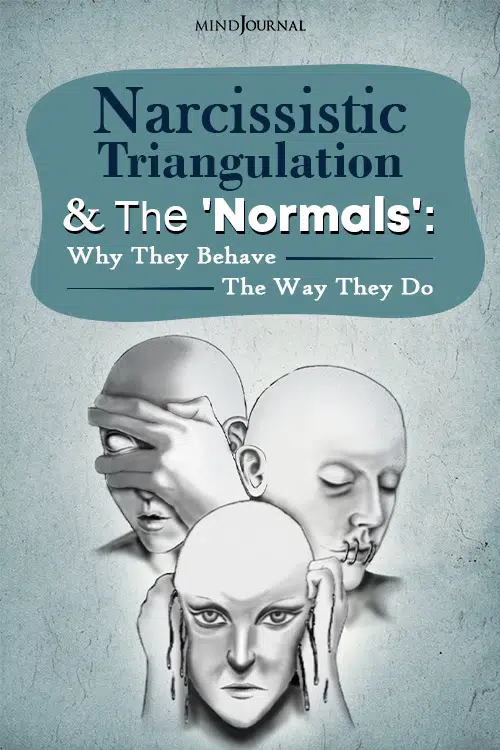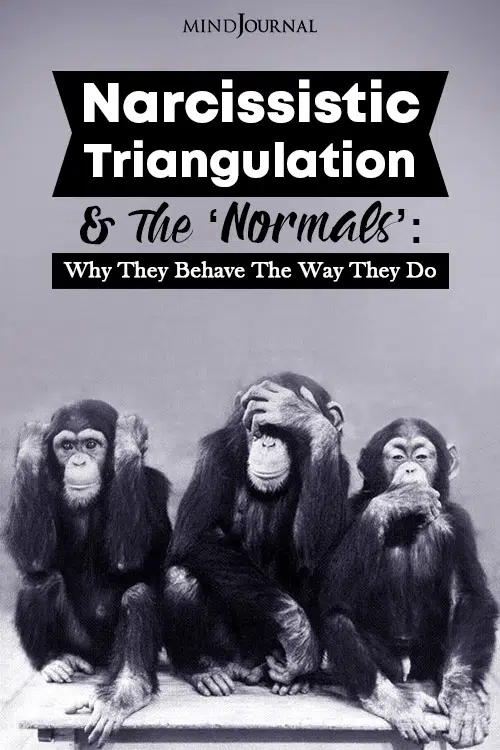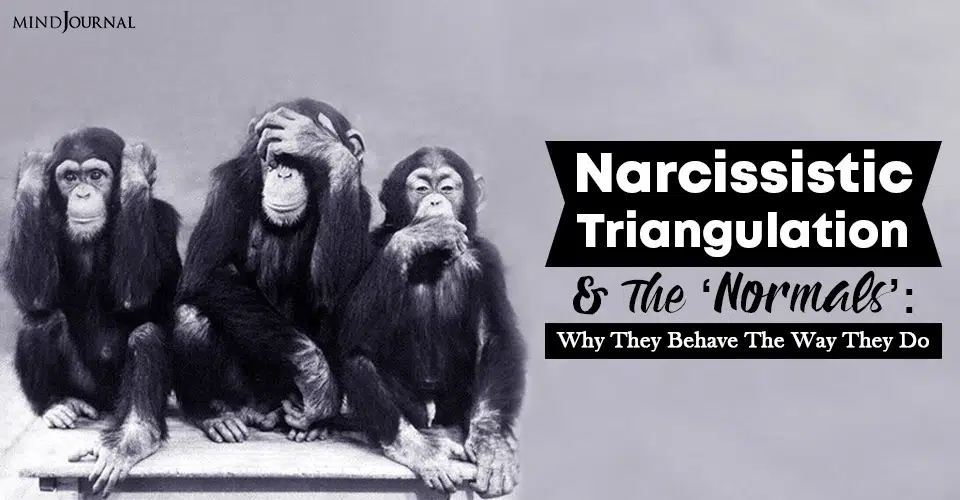A victim of narcissistic triangulation when meets “normals” to share their pain and gain some insight – come across responses that leave them wondering whether the person they are talking to is blind or stupid.
We love to triangulate. Three is the magic number. You, me, and someone else or something else. Another victim? A competitor? A loyal lieutenant? A fresh prospect? An imaginary individual? A threatening event? An inanimate object?
There are so many combinations of triangulation that are available to us and each has its own advantages and rewards for its application for us. In this equation there will always be us, there will always be you and then there will be a third party.
Related: 24 Terms Of Narcissistic Abuse That You Should Know About
One of our effective manipulative triangulations involves the “normals”.
These are people who are neither empathic nor narcissistic but people who are generally decent, sensible, and largely kind who may be supporters of yours, they may be members of our façade but whatever they are they are not you and they are not us.
These are the people who you turn to when you can no longer stand what is happening to you. When you cannot understand what is going on.
When the confusion becomes overwhelming. When you begin to sense something is not quite right. You turn to these normal in the hope of them helping you, understanding your plight, and/or offering some insight.
This is rarely achieved because you are met with responses that leave you wondering whether the person you have just spoken to is blind or stupid. Here are ten instances of this in action.
Are Normals Blind or stupid? 10 Ways They Respond That Make You Think
1. I don’t believe it
Victim – “He is horrible to me, he never lets me do anything on my own anymore, he shouts and calls me awful names.”
Normal – “Really? I just can’t see Nigel behaving like that, he is always so lovely and friendly whenever I see him. I cannot believe he would do that.”
2. Are You Bringing It On Yourself?
V – “I am sick of him controlling me. I try and assert myself, you know, lay down some boundaries, but he is always telling me to shut up and calm down and doing what he wants without any consideration for me.”
N – “Well you have always been feisty my dear, maybe you are provoking him and that’s why he is behaving that way. I don’t mean to be unkind but you do have a bit of temper you know.”
Related: Relationship Stages With A Narcissist or Borderline And Triangulation
3. Not This Again
V– “He has done it again. Disappeared. I have been ringing him on the hour every hour and he won’t answer. I don’t know what it is. I mean, everything seemed okay when we got up this morning, he smiled and asked me if I wanted a cup of tea (cue detailed analysis of every word and interaction thereafter)
N – Glazes over, thinks to themselves “Not this again. I am bored of hearing this. They will be talking again by tomorrow. She worries over nothing.”
4. I Feel Sorry for Him
V – “So he did this, then that, then this again and he always does this you know. He is horrible, Horrible I tell you. I don’t know what to do. Oh, he did this as well and some more of that.”
N – thinks to themselves “I feel sorry for him putting up with someone so neurotic as her. No wonder he clears off for a few days, probably needs the peace and quiet.”
5. Someone Is Exaggerating
V – “No word of a lie, he locked me in the bedroom and threatened to burn the house down with me inside and I heard him laughing as he said this to me. I am so scared of him. He keeps threatening to kill me. He rings me at work and comments about how my brakes are dodgy and laugh and put the ‘phone down.”
N – Thinks to themselves “Sure he does, nobody goes on like that, I do like my friend but she is something of an attention seeker. Every other day there is one of these stories.”
6. I Don’t Think So
V – “So he said that if I didn’t do it he would tell everybody in the church that I was sleeping with the vicar and he would post pictures of me on the internet.”
N – “Who Norman? No way, he is such a solid and respectable man. I don’t think he would ever do anything like that. No, I have known him years, he would never do anything like that.”
7. He Did Say She Was Crazy
V – “He hides my purse so I cannot go out, he tells me what I can and cannot eat, he won’t allow me more than a minute in the shower and stands watching me while I wash. He follows me around the house and keeps staring at me, I can even feel him watching me when I manage to slip out for a while. I know he is following me.”
N- Thinks to themselves “It’s just as Neil predicted. He said she was losing her mind and coming out with all these fantastic stories. He is genuinely worried about her and I can see why now. Poor thing. Poor him too.”
8. Ups and Downs
V – “He sometimes doesn’t speak to me for days on end. He just sits and sulks and ignores me. It is horrible. I hate it.”
N- “Oh that’s just men for you. They all do that at some point. It’s part of the ups and downs of being in a relationship, just ignore it and get on with your day, he will soon come round, you will see.”
Related: Are Narcissists Predictable? The Playbook They Use To Manipulate You
9. Don’t Involve Me
V- “Hi it’s me, can I come round to see you. I need to talk to someone. He is doing it again. He has spent the last two hours shouting at me and throwing plates around the kitchen. I am sick of this, I cannot cope.”
N – “I’d love to help but I er, have an appointment. Look I have to go; I will call you later” – I’m not getting drawn into their domestic dramas I have my own life to look after.
10. I Haven’t a Clue
V- (After a lengthy description of a catalog of odd and strange behavior) “So what do you think, what should I do? I cannot go on like this.”
N- “I don’t know what to say really, I can’t work out why he would be lovely with you one week and then awful the next, it does add up. Perhaps if you sat down together and tried to work things out.” (I haven’t a clue what is going on here.)
Not once does the “normal” turn to you and say,
“You are being abused by a disordered person.”
Or
“You have been ensnared by a narcissist.”
Instead, when you describe the behavior to a “normal” you are met with one or more of the responses detailed above. We know this will be the case. We know it will leave you hurt, bewildered, and lacking the help and insight you so desperately need. And you keep banging your head against the wall thinking if the normals are blind or stupid.
Related: 24 Terms Of Narcissistic Abuse That You Should Know About
Why do ‘The Normals’ respond like this?
1. Lack of knowledge.
Fortunately for our kind few people really know what we are and what we do.
2. We blend in.
We don’t walk around with a sign around our neck stating “I am an abusive narcissist”. . People think the psychopaths and sociopaths appear like some crazed ax murderer. We do not.
3. People although kind is not empathic like you.
Therefore, there is a limit to the time and resources they will apply to assist you. People are inward-looking and care more about their own lives than yours.
4. The façade.
Our charm and magnetism have people believing us to be wonderful and decent people. That façade is hard to shatter. And you keep wondering if ‘normals’ are blind or stupid.
5. Coping abilities.
Your coping abilities are eroded and you are worn out. This makes you appear unhinged, hysterical, and thus in keeping with the image that we have spread around that you are The Crazy One.
6. A Quiet Life.
People do not like conflict. They want people to get on and do not want to become involved in other people’s problems.
7. Behind Closed Doors.
People always take the view that there are two sides to every story. They will listen to you but they will think there is likely to be some explanation which means it is not as bad as you are making it out to be.
You are provoking the abuser, you are making it up, you are being too sensitive and taking things the wrong way. The “normal” think life may be different behind closed doors.
8. Preserve the peace.
People want other people to get on, therefore in order to try to preserve the peace, they will suggest that the behavior is not as bad as has been suggested and pressure the victim to go home and sort things out, unaware it is not something that can be sorted out by having a chat and a cup of tea.
9. The tales of abuse.
The awful treatment seems far-fetched that the “normal” cannot believe them. They have no experience of it and combined with the existence of the façade just cannot see how someone could behave in this way. Therefore, their responses will always make you wonder if they are blind or stupid.
All of this results in you trying to persuade people without success which becomes all the more frustrating and distressing for you. Naturally, we know fine well how people will respond to your protestations and the lack of understanding and knowledge about our kind allows us to blend in, move freely around and continue to behave in this manner with impunity.
You are left wondering if the listener is blind or stupid. They are not stupid. But they are blinded to what we really are.
Just like you were as well.
Please share this article with anyone who you may think will find it valuable and helpful.
Written by: HG Tudor
Originally appeared on: Narcsite.com











Leave a Reply
You must be logged in to post a comment.